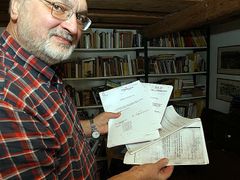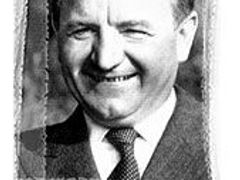Prague - Joseph Stalin could have been quite happy in February 1948.
After Poland and Hungary, finally also Czechoslovakia saw the victory of the working class against the ´reactionists´ and the claim of power by the communists.
And yet, Moscow was very critical of the February overthrow in Czechoslovakia. The Soviets thought that there had not been enough blood involved.
Those facts are based on a unique document that Jiří Pernes, historian from the Czech Institute of Contemporary History, recently found in a Moscow archive.
The analyses was written for Michail Suslov from the Soviet Communist Party Politburo whom the historians consider the red cardinal and the guard of the party's pureness.
Mistakes of the Communist Party
On mistakes made by the Communist Party of Czechoslovakia - that is the title of this study that describes "the theory and practise of the peaceful transition from capitalism to communism without any sacrifices or class war."
Jiří Pernes says that there are more passages in the text which indicate that there should be more casualties in a good revolution based on the theory of aggravated class war.
"They went on and on about the Czechoslovakians not bringing any sacrifices," said Mr. Pernes to Aktuálně.cz. He found the analysis in the former archive of Comintern, the European Union of Communist parties that had its seat in Moscow.
Its authors also criticised the speech of Gustav Bareš, one of the party's ideologists, at the 8th Communist convention where he said that there are situations when the bourgeoisie is so weak that socialism can be achieved in a less bloody and more peaceful way.
Even though Mr. Bareš was referring to Stalin's theories at his speech, the events in February 1948 were not a good example, the communist analysts said.
Misinterpreted Stalin
Soviet researchers claimed that Bareš was misinterpreting Stalin's theories and that the capitalism in Czechoslovakia was not giving up voluntarily.
Moscow analysts also criticised that Czechoslovakia´s communists were overestimating the role of the parliamentary system and did not truly understand how big of a role the masses can play.
The Communist Party of Czechoslovakia was instead of fighting the capitalists rather counting on winning the election in May 1948.
The February government crisis when all of the ministers resigned was not something that the communists were counting on. But they managed to use the situation and obtain the power before May's election.
Another point on Moscow's list was the collectivisation of agriculture to which the communists in Czechoslovakia were rather hesitant at first.
However, later on even the Czechoslovaks decided to start the agriculture coops and follow the "successful" Soviet example.
Gottwald opposing the Soviets?
Historian Jiří Pernes found one more interesting document in the Soviet archives that referred directly to the first communist president of Czechoslovakia Klement Gottwald.
Two Soviet advisers Likhachev and Makharov came to Prague on a mission to find anti-state conspiracy and Western agents. In their letter to Moscow, however, they complained about their difficulties that caused their mission to be unsuccessful. And they blamed Klement Gottwald. He supposedly told them that there are no agents or conspirators in the Communist headquarters.
"I was really surprised that Gottwald was opposing in the beginning," says Mr. Pernes.
Nevertheless, Mr. Gottwald's opposition did not last long.
Conference on February 1948
Finally he gave up to the Soviets´ pressure and that was the beginning of massive roundups. High rank communists Rudolf Slánský nebo Vladimír Clementis were later on among the people sentenced to death in fabricated massive trials of the Czechoslovak Stalin era.
Historian Jiří Pernes will speak about his new discoveries at a three day conference on February 1948 that starts on Monday in Prague. Mr. Pernes says that there are still many questions that still remain unclear.
One of the question is how big of a share the Soviets had on the February events and in following weeks.
"It is not clear yet why Valerian Zorin who was the former Soviet ambassador visited Prague during the February government crisis," says Mr. Pernes.

